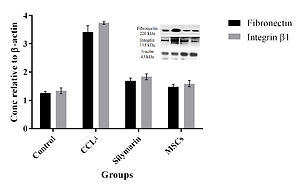Current issue
Archive
Manuscripts accepted
About the Journal
Editorial office
Editorial board
Section Editors
Abstracting and indexing
Subscription
Contact
Ethical standards and procedures
Most read articles
Instructions for authors
Article Processing Charge (APC)
Regulations of paying article processing charge (APC)
HEPATOLOGY / CLINICAL RESEARCH
Mesenchymal stromal cells suppress hepatic fibrosis via modulating expression of fibronectin and integrin and inhibiting DNA fragmentation in rats
1
Department of Biochemistry, Faculty of Pharmacy, October University for Modern Sciences and Arts, Giza, Egypt
2
Department of Pharmacology, Faculty of Pharmacy, October University for Modern Sciences and Arts, Giza, Egypt
Submission date: 2020-11-25
Final revision date: 2021-02-16
Acceptance date: 2021-03-24
Online publication date: 2021-04-08
KEYWORDS
TOPICS
ABSTRACT
Introduction:
Liver fibrosis is currently the 11th most common cause of death worldwide. Because of self-renewal, available sources for isolation, and high differentiation properties, multipotent mesenchymal stromal stem cells are suggested to be a potential tool for treatment of liver fibrosis. In this study, we examined the anti-fibrotic and anti-inflammatory effects of bone marrow-derived multipotent mesenchymal stromal stem cells (MSCs) on liver fibrosis induced by carbon tetrachloride on rats relative to silymarin as a standard drug.
Material and methods:
This study was performed on 40 male Sprague Dawley rats divided into 4 groups of ten rats each: group 1 served as controls, group 2 served as the CCl4 (diseased) group, group 3 served as the silymarin treated group, and group 4 served as the MSC treated group. Liver fibrosis was assessed by determination of liver markers and fibrogenesis-related genes together with anti-inflammatory markers in the liver tissue. DNA fragmentation was assessed by comet assay.
Results:
Mesenchymal stromal stem cells treatment reduced all liver fibrosis markers as well as the oxidative stress and inflammatory markers. Additionally, MSCs reduced the expression of integrins and fibronectin compared with the control group as well as decreasing DNA fragmentation.
Conclusions:
Treatment with MSCs significantly ameliorates liver fibrosis in rats. This amelioration was a result of acting on both the anti-inflammatory and anti-fibrotic activity of hepatocytes.
Liver fibrosis is currently the 11th most common cause of death worldwide. Because of self-renewal, available sources for isolation, and high differentiation properties, multipotent mesenchymal stromal stem cells are suggested to be a potential tool for treatment of liver fibrosis. In this study, we examined the anti-fibrotic and anti-inflammatory effects of bone marrow-derived multipotent mesenchymal stromal stem cells (MSCs) on liver fibrosis induced by carbon tetrachloride on rats relative to silymarin as a standard drug.
Material and methods:
This study was performed on 40 male Sprague Dawley rats divided into 4 groups of ten rats each: group 1 served as controls, group 2 served as the CCl4 (diseased) group, group 3 served as the silymarin treated group, and group 4 served as the MSC treated group. Liver fibrosis was assessed by determination of liver markers and fibrogenesis-related genes together with anti-inflammatory markers in the liver tissue. DNA fragmentation was assessed by comet assay.
Results:
Mesenchymal stromal stem cells treatment reduced all liver fibrosis markers as well as the oxidative stress and inflammatory markers. Additionally, MSCs reduced the expression of integrins and fibronectin compared with the control group as well as decreasing DNA fragmentation.
Conclusions:
Treatment with MSCs significantly ameliorates liver fibrosis in rats. This amelioration was a result of acting on both the anti-inflammatory and anti-fibrotic activity of hepatocytes.
We process personal data collected when visiting the website. The function of obtaining information about users and their behavior is carried out by voluntarily entered information in forms and saving cookies in end devices. Data, including cookies, are used to provide services, improve the user experience and to analyze the traffic in accordance with the Privacy policy. Data are also collected and processed by Google Analytics tool (more).
You can change cookies settings in your browser. Restricted use of cookies in the browser configuration may affect some functionalities of the website.
You can change cookies settings in your browser. Restricted use of cookies in the browser configuration may affect some functionalities of the website.



